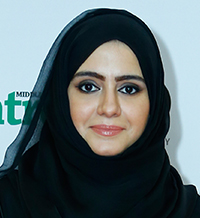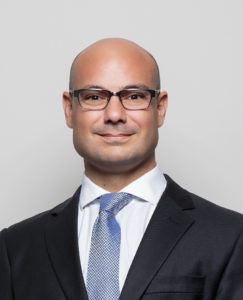Greater trust comes from stronger collaboration, says Chief Innovation Officer, UAE Ministry of Infrastructure and Development; participants of World Future Energy Summit discuss impact of smart solutions and trends in energy, water

Anwaar Al Shimmari
ABU DHABI, UAE, 20 January, 2020: The government is the best incubator for innovative ideas, but we should have an ecosystem for these ideas, said Anwaar Al Shimmari, Director – Design Department, Chief Innovation Officer, UAE Ministry of Infrastructure Development, who pointed out that it is important to ensure that government entities and private sector understand the requirements of both parties. Al Shimmari was speaking on the sidelines of the World Future Energy Summit, held from January 13 to 16 in ADNEC, Abu Dhabi. The Summit hosted four key forums on Smart City, Water, Energy and Solar, and EcoWaste, which provided a comprehensive overview of emerging trends across the utility sector in the move towards sustainability and promotion of resource efficiency.
Sharing insights as a participant in the Smart Cities Forum, Al Shimmari said that considering smart technology systems and Artificial Intelligence (AI) tools require huge investment, it is important for solution providers to provide greater support to entities and clients to ensure integrated systems are optimised and to have a greater understanding of market requirements. “It’s not only about delivering AI tools, it’s also about understanding how to help the government deal with the right tools,” she said. “As part of the government, I have to ask, ‘Once I implement this, who will maintain it? Is it easy to maintain? Do I need to train people?’” These concerns, she said, are key reasons why government and end-users are hesitant to implement such solutions.

Rami Ghandour
Al Shimmari said that in certain cases when tools are implemented, they are not optimised according to their full potential, with the entity utilising only 10% or 50% of their actual capabilities. “I would encourage all entities, when they have a tool, to make sure they optimise it, because we need to see results, and these results will help the whole,” she said. Al Shimmari said solution providers could greatly help in this regard by providing greater support following installation of such solutions. “I would encourage businesses who have these products to always consider the whole cycle,” she emphasised. “The whole idea is not only to sell – the trust becomes more when collaboration is higher.”
Rami Ghandour, Managing Director, Metito, also touched on the growing impact new technologies have on the water sector, during his participation as a panelist and moderator in the Water Forum. “There’s a lot of new technologies out there, but how do you implement them in practice?” he asked. “Because utilities, in general, are very conservative creatures, so it’s very difficult for any technology startup to be able to integrate. You have got to convince the end user, you have to voice the financiers, then develop it – everyone has to come in to be part of implementing a new technology, in order to get the greater efficiency. One of my concerns, speaking for the water sector, is that a lot of our technology is old. We are a very slow-moving sector in terms of adaptation and implementation of technology, so I was very happy that I think there is a market effort from different parties.”
Ghandour said that during the Summit, two slightly contrasting themes also emerged following exchange among participants and key decision-makers during the Water Forum. “One is the decoupling of the water from the power,” he said. “Historically, you have had IWPPs all together, and now you see that you might optimise water, you might optimise power, but you do it separately.” This trend, he said, raises questions on what can be done to unlock the benefits of alternative energies, which have become cheaper and easier to access as a source to run utilities. Another emerging trend, Ghandour noted, is the move towards multi-utilities, which can be seen in some projects. “The Red Sea project in Saudi is one where they integrate under one contract, for the first time in the region, private development of water and wastewater, conventional and renewable power, district cooling and waste management all under one umbrella,” he said. “It’s that multi-utility combination for all of these utility types. Is that the way forward or not? Obviously, there are multiple sides to that argument to be had.”
Copyright © 2006-2025 - CPI Industry. All rights reserved.